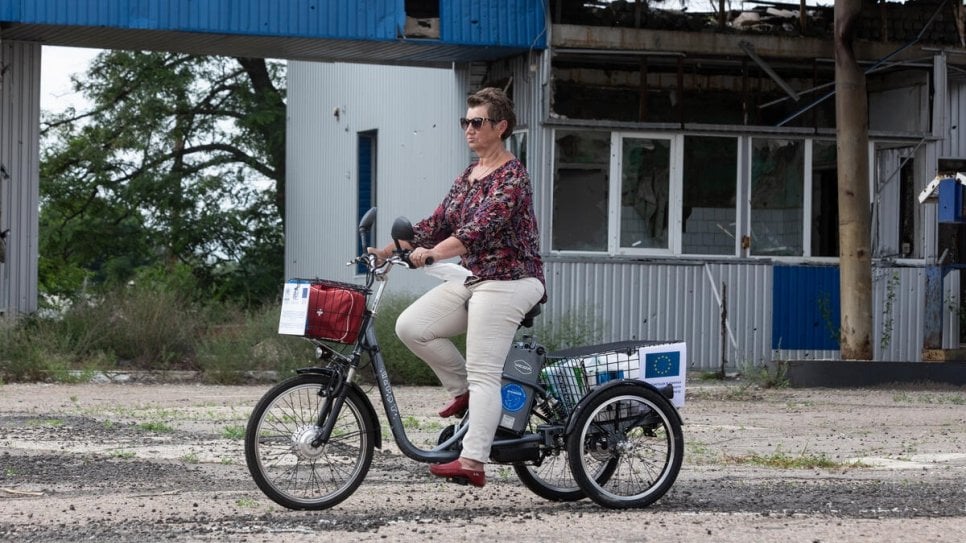Volunteers are using bicycles and tricycles donated by UNHCR to reach vulnerable people in eastern Ukraine with aid and companionship.

Volunteers and social workers have been provided with 228 bicycles and 35 electric tricycles to visit communities located near the contact line in eastern Ukraine. © UNHCR/Pavlo Pakhomenko
Ievdokia Chepel is like many older people in rural eastern Ukraine. She suffers from health problems while the region’s seven-year conflict and, more recently, the COVID-19 pandemic have worsened her sense of isolation.
For decades, she worked in a factory, but at 77 she is retired and a widow. Her son died last year and she rarely sees her daughter and granddaughter who live in Luhansk, Ukraine’s second biggest city, on the other side of the contact line that divides government and non-government territory.
“I feel very isolated and lonely. It is hard to live alone,” she said through tears.
But since last year, help has arrived in an unexpected form: on three wheels.
“She is taking care of me and giving me help.”
Every few days, Tetiana Vasiukova loads her electric tricycle with supplies in a village in the Luhansk region. She then tours local communities to deliver aid and companionship to isolated residents.
Many of the people she visits are displaced by the conflict and others, like Ievdokia, risk being forced from their homes.
“I feel very grateful that Tetiana visits me regularly,” Ievdokia said. “She is taking care of me and giving me help. It makes me feel much better.”
Tetiana, 68, used to work as a deputy bank manager in Luhansk but has committed herself to helping those affected by the conflict since she retired. As a local, she understands the problems faced by other residents, many of whom live on small plots of land where they grow their own vegetables.
“Almost every day, I take my electric bike and come to a shop or a pharmacy to do shopping for elderly people who reside in our community,” she said.
Tetiana and other volunteers used to deliver food and medicine via bus or taxi, but last year UNHCR, the UN Refugee Agency, used funding from the European Union to provide medical and social workers with 228 bicycles and 35 electric tricycles.
The pedal transport helps keep costs down for the volunteers and it also makes some homes more accessible, given the sometimes difficult roads. Bicycles and tricycles are equipped with baskets and can travel up to 40 km/h with a range of 40 kilometers before they need to be charged.
“With an electric bike, I am not attached to anyone. I just go when I need to and I do not have to worry about carrying heavy bags,” Tetiana said.
The pandemic has exacerbated humanitarian needs in eastern Ukraine where the conflict has already put 3.4 million people in need of protection and assistance.
They include around 340,000 people forced to flee their homes who now face hardship in eastern and other regions. Older people, people with disabilities and houses headed by women are among the most vulnerable.
The network of bicycles and tricycles is just one innovation that is helping these populations.
Technology also plays a role in an area where infrastructure such as medical facilities, banks and post offices is sometimes lacking.
UNHCR and its NGO partner Proliska launched an electric car service in Luhansk region in 2019 at the Stanytsia Luhanska pedestrian checkpoint on the contact line, at a point where people have to get out of vehicles and cross on foot for security reasons.
The service can transport 400 people a day and gives priority to pregnant women and children, people with disabilities and those over 75.
In another development, aid groups including the U.S. Bureau of Population, Refugees and Migration and the EU Civil Protection and Humanitarian Aid, along with UNHCR and Proliska, have installed two bus stations at Stanytsia Luhanska equipped with solar panels and power sockets to charge smartphones and tablets. The charging points and Wi-Fi installed earlier are particularly useful during the pandemic when anyone crossing the line of contact must use an app for contact tracing.
The technology and the willingness of the volunteers means that even in the face of difficulties there is hope.
“Many people can’t come and take care of their land plots, houses are slowly collapsing and there are weeds in every second plot. But every morning, I switch on my electric tricycle and I feel better because I know I can make this place better by helping people,” said Tetiana.
Share on Facebook Share on Twitter